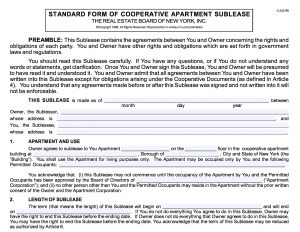 Previous blog posts have discussed potential cooperative rule violations and the procedures to be followed by the co-op when a shareholder violates provisions of the proprietary lease or the house rules. This post will discuss more specifically the issues which arise when a shareholder attempts to sublet their co-op apartment to another person.
Previous blog posts have discussed potential cooperative rule violations and the procedures to be followed by the co-op when a shareholder violates provisions of the proprietary lease or the house rules. This post will discuss more specifically the issues which arise when a shareholder attempts to sublet their co-op apartment to another person.
It first should be noted that most co-ops have in their proprietary leases specific rules about who can live in the apartment, if they are not the shareholder listed as an owner on the share certificate. It is usually limited to direct relatives, such as one’s spouse, children, parents, domestic partner, and the like. Having these people live in the apartment at the same time as the shareholder is not considered a sublet situation. However, the proprietary lease usually also has rules limiting usage. The shareholder must also be living at the apartment, together with the relatives in or guests question.
To give an example, let’s say the shareholder is elderly and shares the apartment with her adult son. She then decides to move to Florida and wishes for her son to continue living in the apartment in New York. This would most likely be considered a violation of the proprietary lease by the co-op, as the shareholder is no longer living at the unit. Such a violation, if discovered by the co-op, could result in a default notice being issued to the shareholder for having unauthorized persons residing at the apartment. Note again that if the shareholder is living at the unit at the same time with her family, it would probably not be considered a violation. The reasoning behind this is that the co-op wants their units to be owner-occupied and to approve those occupying the apartment. They will allow direct family members to share the unit, but only when the owner is also living there.
A more prevalent situation is when the unit owner does not want to reside at the unit, and decides to sublet it to a third party who is not a direct relative. For the reasons stated above, most New York co-ops have strict rules about subletting. They generally prefer that units be owner-occupied, and will have restrictions on subletting. This restrictions can include the length of a sublet (usually requiring a minimum of one year, and a maximum of two years, without the right to renew) and often require all sublets to be approved by the cooperative board. A written lease and sublet application will be required to be submitted to the Board for approval.
What happens when a shareholder sublets her unit, but fails to seek required co-op board approval? If the co-op discovers the “illegal” sublet, it will most likely issue a warning notice to the shareholder to cure the sublet violation. If the shareholder fails to comply, the co-op will issue a default notice, which may result in the shareholder losing her shares, and the apartment. We recommend that shareholders in this situation contact experienced counsel to discuss the situation with the counsel for the cooperative. If the subtenant refuses to vacate, then a landlord-tenant action must be brought by the shareholder to evict. Otherwise, the shareholder runs the risk of losing her apartment ownership. It is important to have counsel keep the cooperative counsel appraised of the status of the eviction action, so that the co-op is aware that the shareholder is doing everything in her power to remedy the violation.
Our firm regularly addresses potential cooperative violations and looks forward to engaging and assisting any parties in this situation.
 New York Real Estate Lawyers Blog
New York Real Estate Lawyers Blog

